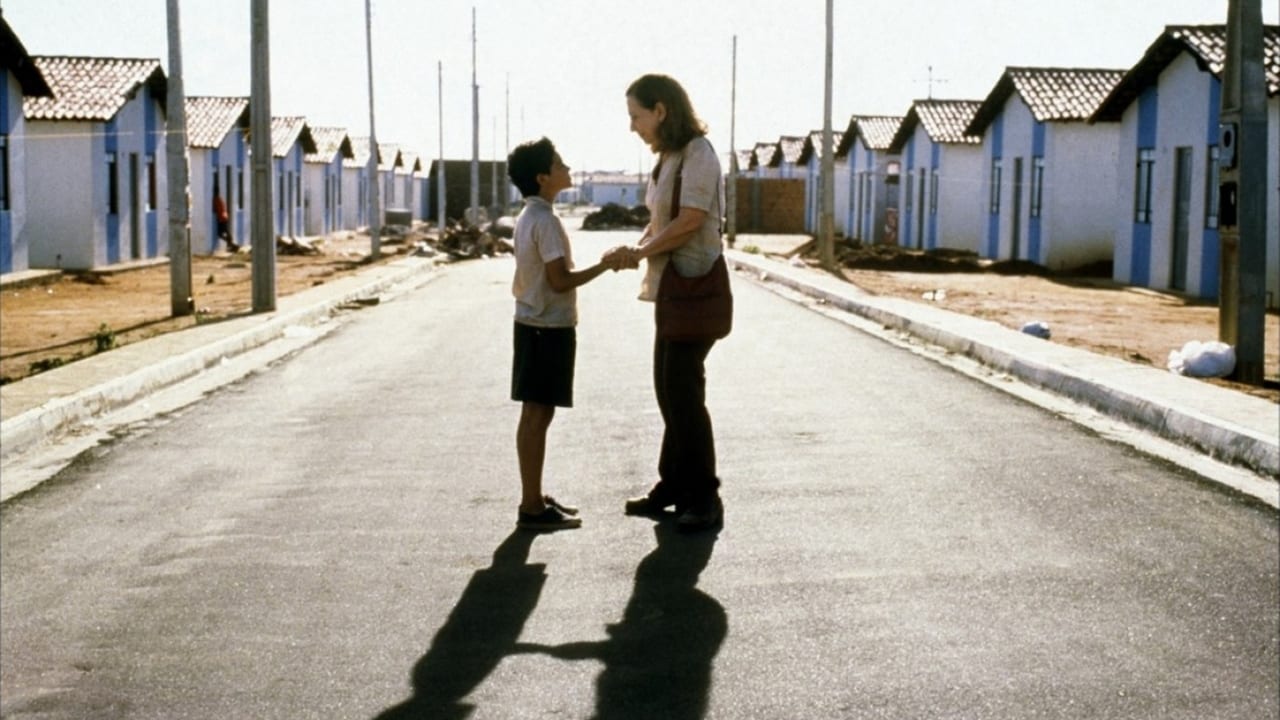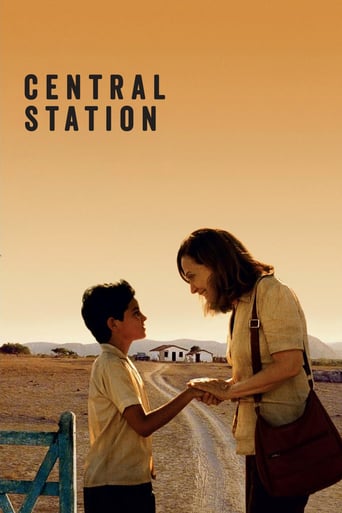

the audience applauded
... View MoreAn absolute waste of money
... View MoreWhile it doesn't offer any answers, it both thrills and makes you think.
... View MoreI think this is a new genre that they're all sort of working their way through it and haven't got all the kinks worked out yet but it's a genre that works for me.
... View MoreAfter a decade, I return to this unique experience, the best Brazilian film I've ever seen. Now, as a more mature spectator, the script came to me like a thump, talking about journeys, learning and things that, even though they are the most unforgettable, have to be left behind. "Central Station" is for the world!
... View MoreWhen an elderly woman's conscience gets the best of her, she rescues a young boy who recently lost his mother and embarks on a journey to unite the boy with the father he never knew. One is given enough clues to understand that the effort will not end successfully in one respect, as the absent father's reputation seems to precede him as a drunkard and a louse. What one doesn't see coming is the fact that the man actually had another family, having married Josue's (Vinícius de Oliveira) mother after his first wife died. Not only did Josue not know his real father, he was not aware that he had two older step-brothers, one of which shared a similar disdain for his wayward parent. I was a little taken aback at how acerbic Josue was toward Mrs. Dora (Fernanda Montenegro) at first, calling her ugly for looking like a man and generally treating her with disrespect. It went both ways somewhat, but Dora's innate humanity eventually came forward to save a young soul who might otherwise have been cast to any manner of bad outcomes. As they grew to know one another a little better, you could feel the bond forming between them. If I had to guess, I would bet that Dora threw in that line in the letter she read from the missing father to Josue's mother, the one about desiring to live with her and his other sons, including Josue. The kid wasn't buying it, but for the viewer, I think it remains in the eye of the beholder.With all that went before, I thought the ending was somewhat abrupt, but then again, that's how life goes sometimes. Though it wasn't necessarily a 'happy ever after' conclusion, one comes away with a warm feeling that the young boy Josue would not be left to a heartless world as long as understanding individuals like Mrs. Dora were around.
... View MoreCentral Station is a road movie set in Rio where it is a dog eat dog society if you are poor. Dora a retired teacher works in a train station concourse where she writes letters for illiterates and usually does not post them even though she has been paid for this service.Josue is a young boy who has been orphaned since his mother was hit by a bus. He is a wise kid sensing Dora was scamming her mother who paid her to write letters to his father far away.Dora reluctantly takes him in but she has no altruistic reasons for this. She sells him to an adoption agency and uses the money to buy herself a new television set. Her friend tells her that the kids are not adopted, their organs are used for transplants.Maybe it is guilt, she takes him back and they go looking for his father with the little money they have. Dora is still reluctant, along the way she tries to leave him once more but something inside her makes her stick with him.They get to Josue's father's town but things get more complicated which includes meeting half siblings. The film is more about Dora, a selfish woman wrapped up in her world, trying to get by whilst making a buck. The journey stirs her own memories with her father. She realises at the end that Josue needs to be with his family and uses her writing skills to good effect this time.
... View MoreThis story happens in an impoverished area in Brazil. The buzzing, noisy central station is infatuated with people bustling for nothing but life necessities. To put it into more vulgar words, people's life is cheap. It can be seen in this film that a thief is shot dead by the vendor.It is this exact reason that makes this film even moving than, say, if it happens in The United states. When one is living in indecent conditions, one should be given more credit if s/he offers to help others.Isadora is such a woman. She is not a good person in a strict sense. After retirement as a primary school teacher, she makes ends meet by deceit, i.e. helping illiterate people write and send letters but tears up those letters back home. By fate, she is connected with a boy named Josue. Josue's mother, one of Dora's client, is killed in a road accident.After several mental struggles with herself, Dora decides to help Josue find his father according to the letter. On the long way to the kid's father, Dora and Josue's relationship turns better and better and finally they become friends.Shortly after they find the location of Josue's father, it comes the time for them to part from each other. Dora writes a letter to Josue and in this letter Dora asks Josue not to forget her.I think Dora wants to be remembered as she devotes her love to Josue particularly she does not have a happy childhood memory. Her fundamental humanity is awakened during this journey. Yet this selfless help is not a pleasant experience for Dora as she sees how Josue's father and brothers love little Josue which for sure reminds her of those painful childhood memories. Despite all, the awakened humanity impulses her to leave Josue to where he can grow up with love and care. In a sense, she chooses Josue to help finish her unfinished childhood dream for a caring father and family. Loving someone but letting someone fly to better places is a huge sacrifice yet the highest rank of love.Thus, Dora does not want to be forgotten. I remember one line extremely clearly, 'When you grow up and drive the truck one day, do not forget that I am the first one who let you sit behind the wheels.'
... View More